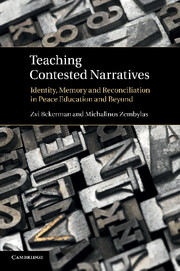
-
Select format
-
- Publisher:
- Cambridge University Press
- Publication date:
- 05 December 2011
- 01 December 2011
- ISBN:
- 9781139015646
- 9780521766890
- 9781107663770
- Dimensions:
- (228 x 152 mm)
- Weight & Pages:
- 0.55kg, 272 Pages
- Dimensions:
- (229 x 152 mm)
- Weight & Pages:
- 0.37kg, 272 Pages
- Subjects:
- Political Sociology, Psychology, Sociology, Educational Psychology
You may already have access via personal or institutional login- Subjects:
- Political Sociology, Psychology, Sociology, Educational Psychology
Book description
In troubled societies narratives about the past tend to be partial and explain a conflict from narrow perspectives that justify the national self and condemn, exclude and devalue the 'enemy' and their narrative. Through a detailed analysis, Teaching Contested Narratives reveals the works of identity, historical narratives and memory as these are enacted in classroom dialogues, canonical texts and school ceremonies. Presenting ethnographic data from local contexts in Cyprus and Israel, and demonstrating the relevance to educational settings in countries which suffer from conflicts all over the world, the authors explore the challenges of teaching narratives about the past in such societies, discuss how historical trauma and suffering are dealt with in the context of teaching, and highlight the potential of pedagogical interventions for reconciliation. The book shows how the notions of identity, memory and reconciliation can perpetuate or challenge attachments to essentialized ideas about peace and conflict.
Reviews
‘This is a critically important analysis of assumptions in peace education, based on a rich corpus of research in Israeli and Cypriot classrooms. The analysis challenges assumptions about our understanding of identity, memory and reconciliation, and challenges us to help children envisage and realise alternative futures.’
Tony Gallagher - Professor of Education and Pro Vice Chancellor, Queen's University, Belfast
‘… a most compelling ethnographic comparative study of education that deals with issues of conflicting memories, identities and historical narratives in divided societies. It raises serious questions that challenge the prevailing psychologically oriented and Western-based epistemologies of peace education. Being written for both professionals and practitioners, it is a must read for anybody in the field of reconciliation, peace education and forgiveness.’
Gabi Salomon - Professor Emeritus and Head of the Center for Research on Peace Education, Haifa University, Israel
Contents
Metrics
Full text views
Full text views help Loading metrics...
Loading metrics...
* Views captured on Cambridge Core between #date#. This data will be updated every 24 hours.
Usage data cannot currently be displayed.
Accessibility standard: Unknown
Why this information is here
This section outlines the accessibility features of this content - including support for screen readers, full keyboard navigation and high-contrast display options. This may not be relevant for you.
Accessibility Information
Accessibility compliance for the PDF of this book is currently unknown and may be updated in the future.

